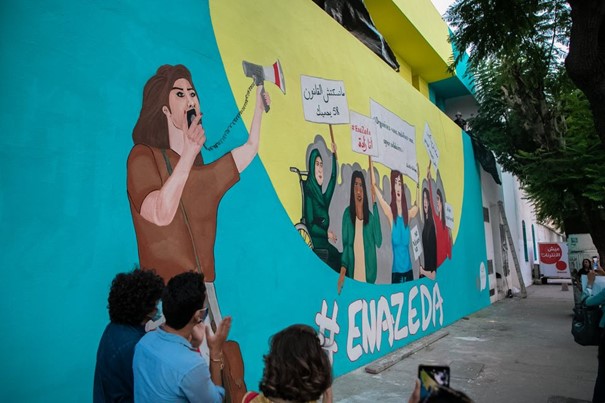#MeToo—five years of breaking the silence on social media
Five years have passed since the MeToo-movement went viral. It has challenged the culture of silence and given voice to victims of sexual violence all over the world—but it is also part of a larger, global movement of change and resistance.

It was on October 15th in 2017 that the American actor Alyssa Milano published a tweet asking all women subjected to sexual harassments to reply to her with the words “me too”. The appeal went viral and the hashtag #MeToo spread over the world. The term was coined eleven years earlier by the American women’s rights activist Tarana Burke to shine a light on the vulnerability of above all black girls in the US.
In several countries, regional varieties of the call emerged after the breakthrough in 2017. A Tunisian MeToo-movement was sparked after a Tunisian member of parliament was accused of sexually harassing a schoolgirl. Kvinna till Kvinna’s partner organisation Aswat Nissa was a driving force in the campaign, which played a crucial role in getting the man sentenced to one year in prison. Aswat Nissa started a Facebook group under the hashtag #EnaZeda, Tunisian Arabic for “me too”. In the group, everyone subjected to sexual harassments and violence can share their experiences and #EnaZeda has contributed to breaking the culture of silence surrounding sexual violence in Tunisia, as well as showing perpetrators that they no longer can get away with their crimes.
A historic moment
In 2021, a #MeToo wave swept across the majority of the Western Balkans, sparked by Serbian actress Milena Radulović reporting her high-school drama teacher, a famous producer, to the police. Her actions encouraged many women and girls to speak out under the hashtags #nisisama (you’re not alone) and #nisamtrazila (I didn’t ask for it).
Another country which has developed its own #MeToo-movement is Georgia. The Georgian version of #MeToo kicked off as early as 2016 when journalist Tatia Samkharadze brought a civil case of sexual harassment against her former boss. At that time, Georgia had no law that would give victims of sexual harassments justice and remedy. Despite this, the court used a progressive interpretation of the existing law and Samkharadze won the case in both the first instance and in the court of appeal.
More and more women began to speak up about their experiences of sexual harassments and further cases were brought before the public defender’s office and ombudsman.
“Finally, in 2019, sexual harassment was legally classified as a form of discrimination in Georgia, meaning that victims are now able to seek justice before a court, receive compensation and hold perpetrators to account. Before this, sexual harassment was outlawed in the workplace but did not carry any punishment. This was a historic moment for the women’s rights movement in Georgia,” says Konul De Moor, programme officer at The Kvinna till Kvinna Foundation in South Caucasus.
Exclusion and stigma
#MeToo can be viewed as a part of a larger movement where both related and independent initiatives have started, both before and during the 2017 success. For example, Burke’s work is still on-going and has gained increased support through the success of the hashtag.
In other parts of the world, above all in sub-Saharan Africa, #MeToo hasn’t had such a great impact. Part of the reason could be that the movement is considered West-centric and inaccessible as it was amplified by wealthy, white women within the American entertainment industry with large public platforms. Other explanations could be that the stigma surrounding testifying about or reporting sexual harassments and violence still is great, and that the justice system in many countries doesn’t stand on the side of the victim.
Change in progress
Many other and similar initiatives have, however, emerged from regional contexts. In South Africa the campaign #EndRapeCulture was started in 2016, in Kenya the campaign #MyDressismyChoice was started a few years before, and in Senegal, two young women started the campaign #Nopiwouma (”I will not shut up” in Wolof) to challenge the culture of silence and the patriarchal norms in Senegal.
#MeToo has contributed to making the large and global problem that is sexual harassments and sexual violence visible. But it’s spreading—and lack of spreading—has also exposed the need for more work in making the movement inclusive and relevant for all women. Many victims still live in silence, and the possibility to share one’s experiences in public doesn’t exist for all. As five years has passed since the #MeToo-movement started, this might point out a direction ahead.